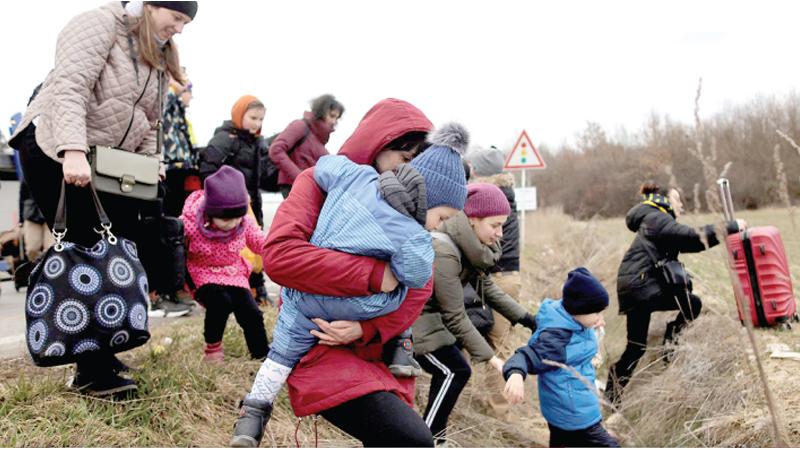
As millions of women and children flee across Ukraine’s borders in the face of the Russian invasion, concerns are growing over how to protect the most vulnerable refugees from being targeted by human traffickers
In Siret, Romania one man was detained in Poland suspected of raping a 19-year-old refugee he’d lured with offers of shelter after she fled war-torn Ukraine. Another was overheard promising work and a room to a 16-year-old girl before authorities intervened.
Another case inside a refugee camp at Poland’s Medyka border, raised suspicions when a man was offering help only to women and children. When questioned by police, he changed his story.
As millions of women and children flee across Ukraine’s borders in the face of the Russian invasion, concerns are growing over how to protect the most vulnerable refugees from being targeted by human traffickers or becoming victims of other forms of exploitation.
“Obviously all the refugees are women and children,” said Joung-ah Ghedini-Williams, the UNHCR’s head of global communications, who has visited borders in Romania, Poland and Moldova.
“You have to worry about any potential risks for trafficking — but also exploitation, and sexual exploitation and abuse. These are the kinds of situations that people like traffickers … look to take advantage of,” she said.
The UN refugee agency says more than 2.5 million people, including more than a million children, have already fled war-torn Ukraine in what has become an unprecedented humanitarian crisis in Europe and its fastest exodus since World War II.
In countries throughout Europe, including the border nations of Romania, Poland, Hungary, Moldova and Slovakia, private citizens and volunteers have been greeting and offering help to those whose lives have been shattered by war. From free shelter to free transport to work opportunities and other forms of assistance — help isn’t far away.
But neither are the risks.
Police in Wrocław, Poland, said on Thursday they detained a 49-year-old suspect on rape charges after he allegedly assaulted a 19-year-old Ukrainian refugee he lured with offers of help over the internet. The suspect could face up to 12 years in prison for the “brutal crime,” authorities said.
“He met the girl by offering his help via an internet portal,” police said in a statement. “She escaped from war-torn Ukraine, did not speak Polish. She trusted a man who promised to help and shelter her. Unfortunately, all this turned out to be deceitful manipulation.”
Police in Berlin warned women and children in a post on social media in Ukrainian and Russian against accepting offers of overnight stays, and urged them to report anything suspicious.
Tamara Barnett, director of operations at the Human Trafficking Foundation, a UK-based charity which grew out of the All Party Parliamentary Group on Human Trafficking, said that such a rapid, mass displacement of people could be a “recipe for disaster.”
“When you’ve suddenly got a huge cohort of really vulnerable people who need money and assistance immediately,” she said, “it’s sort of a breeding ground for exploitative situations and sexual exploitation. When I saw all these volunteers offering their houses … that flagged a worry in my head.”
The Migration Data Portal notes that humanitarian crises such as those associated with conflicts “can exacerbate pre-existing trafficking trends and give rise to new ones” and that traffickers can thrive on “the inability of families and communities to protect themselves and their children.”
Security officials in Romania and Poland told The Associated Press that plain-clothed intelligence officers were on the lookout for criminal elements. In the Romanian border town of Siret, authorities said men offering free rides to women have been sent away.
Human trafficking is a grave human rights violation and can involve a wide range of exploitative roles. From sexual exploitation — such as prostitution — to forced labour, from domestic slavery to organ removal, and forced criminality, it is often inflicted by traffickers through coercion and abuse of power.
A 2020 human trafficking report by the European Commission, the EU’s executive branch, estimates the annual global profit from the crime is 29.4 billion euros ($32 billion). It says that sexual exploitation is the most common form of human trafficking in the 27-nation bloc and that nearly three-quarters of all victims are female, with almost every fourth victim a child.
Madalina Mocan, committee director at ProTECT, an organisation that brings together 21 anti-trafficking groups, said there are “already worrying signs,” with some refugees being offered shelter in exchange for services such as cleaning and babysitting, which could lead to exploitation. -FirstPost
